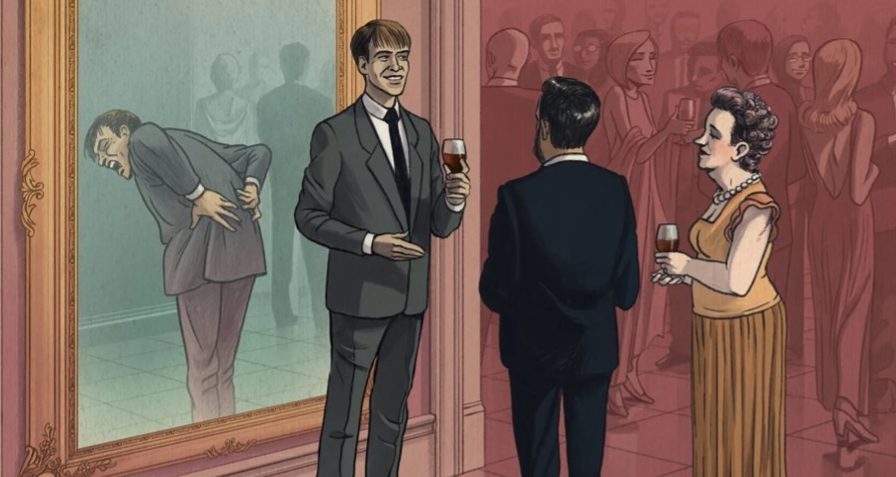
How Chronic Low Back Pain Calls for Attention to the Gap Between the Mind-Body Connection
Attention to the relationship between the mind and the body is finally starting to be seen, yet is not adequately being integrated into clinical treatments. A prominent example of this gap is the treatment of depression in people suffering from chronic low back pain.
- Author:
- Devin Merriman
- Date:
- October 28 2024
It comes as a surprise to some when I mention that I have already braved the debilitating characteristics of chronic back pain in my early twenties. Some people have made jokes about me being a “grandma” already at my young age because of my back pain, which might be because the majority of people with chronic low back pain (CLBP) are over the age of 50, according to a 2023 report from the World Health Organization (WHO). The report states that low back pain has troubled 619 million people worldwide and is expected to escalate to over 800 million within the next 25 years. These numbers are alarming––but not alarming enough––considering the World Health Organization and I are in accord that this disability should be considered a public health problem requiring more attention than it has received.
Low back pain is the dominant cause of disability globally and continues to reduce the quality of life of so many individuals. Maybe you’ve been diagnosed with chronic low back pain, or maybe you know someone who has. You’ve probably seen their uncomfortable shifts in movement or have noticed their withdrawal from social gatherings or work. Regardless of if you are an incredibly healthy or careful person, most people will experience low back pain at some point of their lives, according to the WHO report.
As a newly graduated university student with plans to advance my knowledge and degree with a doctorate in Clinical Psychology, I consistently find myself wondering about the mind-body connection. Throughout my bachelor studies in the fields of psychology and neuroscience, something became apparent: there is a decently strong division between the two fields in terms of the treatment of disorders that are diagnosed within both. This always confused me, as I always believed the two fields to be interconnected…perhaps because they both study the brain! The more I thought about this, the more I noticed that there is a division between psychology and any clinical doctor studying the body, as there seems to be a gap between physical and mental health as well.
Attention to the relation between the mind and the body is finally starting to be seen within research, articles, books, documentaries, etc., however are not necessarily adequately being integrated into clinical treatments. A prominent example of this gap is the treatment of depression in people suffering from CLBP. A 2023 study on the phenotypes of low back pain by orthopedic doctors found that depression is the leading mental health diagnosis in patients with CLBP. Interestingly, numerous studies, including a 2023 study published to the National Institute of Health, note that not only is there a higher percentage of depression seen in people with CLBP, but that there is a higher incidence of low back pain found in people that are diagnosed with depression. These findings suggest that the relationship between low back pain and depression––two disorders that cause high levels of disability––may be bidirectionally related. Although the underlying mechanisms of the association between the two disorders are being studied, and would be beneficial for researchers and doctors to understand, I wonder why there is not more of an effort to address this clear association in treatment settings.
Why is there a disconnection between doctors and psychologists to create sufficient treatment plans for their patients, given there are already existing treatments for them separately?
The quality of life of individuals is significantly negatively impacted in people with CLBP, but to add depression onto it creates an even larger problem that is not being sufficiently acknowledged within healthcare settings. Why should we let people suffering from an already incredibly difficult disability suffer more with a difficult mental health problem? The research is clear. It shows that there is a strong correlation between disabilities, and that this comorbidity is a serious problem that affects so many people.
Depression and chronic low back pain can make it nearly impossible to get out of bed sometimes. The constant, agonizing sharp pain pinching your back and shooting down your leg or the feeling of someone squeezing your lower back muscles so hard you think they might pop often can lead to you questioning if this will last forever. The hopelessness weighing on you because of a fear of being in pain causes you to pull out from your social life, and the inability to get out of bed somedays can cost you your job.
Both depression and chronic low back pain can significantly impact people’s quality of life in terms of their social lives, work lives, and emotional and physical wellbeing. Yes, more research is always beneficial to any field of study, but when there is already a clear association between two debilitating disabilities, attention must be sought out for the greater good of the global population. This article serves as a call for help, awareness, advocacy, and knowledge to the fields of psychology and orthopedics to bridge the gap between medicine and psychology and to start working together to address very apparent problems in our healthcare systems. Since this problem is so widespread and, as stated previously, should be considered a global health problem, these fields could act as a model for others to be confident that polarization between fields should end when everything in our body is, in fact, connected.
Are you ready to take the journey?
Take the journey and find your nature guide.


